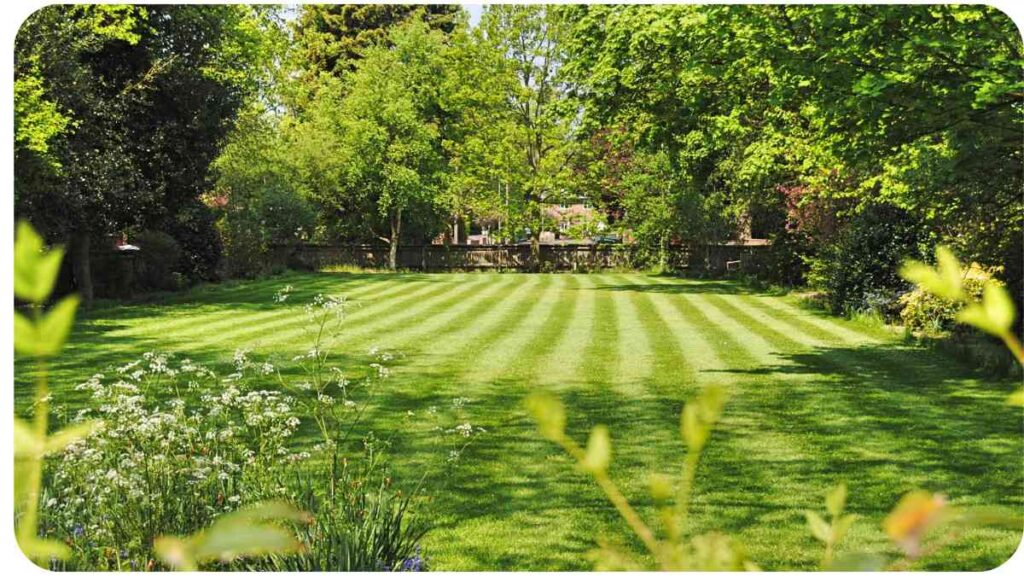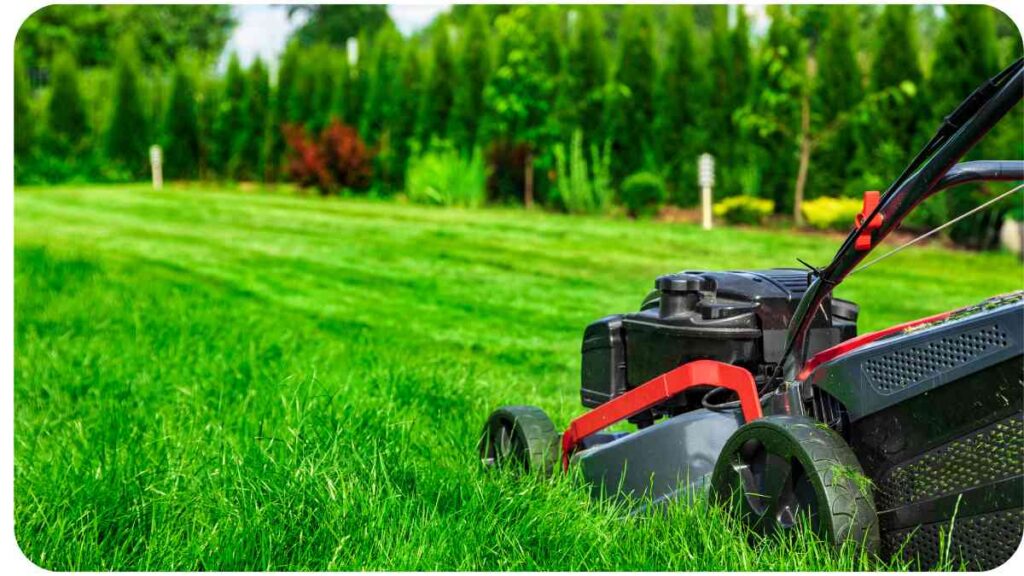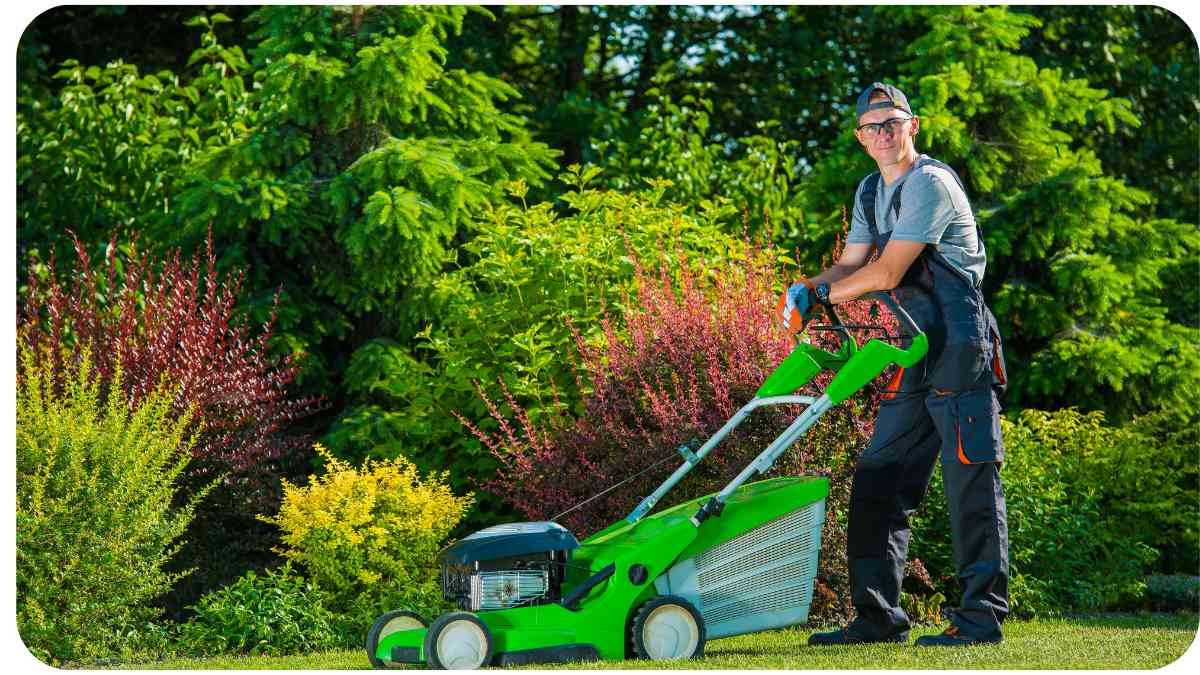Welcome to the ultimate guide on tackling those unsightly brown patches that have taken over your once-lush green lawn. As a seasoned SEO content writer with a profound understanding of lawn care, I’m here to help you rejuvenate your lawn to its former glory.
In this comprehensive article, we’ll delve into the root causes of these brown patches and explore practical solutions to restore your lawn’s vibrancy.
| Takeaways |
| 1. Brown patches on your lawn have common causes like inadequate watering, fungal infections, soil compaction, and insect infestations. |
| 2. Prevent brown patches with proper watering, lawn aeration, and disease/pest control. |
| 3. Use high-quality lawn products such as grass seeds, fertilizers, and weed killers to maintain a healthy lawn. |
| 4. Seek professional lawn care services if DIY solutions don’t resolve the issue. |
| 5. You can often save a lawn with brown patches through re-seeding and proper care, avoiding starting from scratch. |
2. Understanding Lawn Health

Before we jump into solutions, let’s establish the fundamentals of maintaining a healthy lawn. Your lawn is more than just grass; it’s a living ecosystem that thrives on a delicate balance of elements like water, nutrients, and sunlight.
3. Identifying Brown Patches
The first step in resolving the issue is to identify the brown patches and understand why they are occurring. Brown patches can manifest in various shapes and sizes, and they may be scattered or concentrated in specific areas.
Achieving a lush, healthy lawn requires proper care and maintenance. Follow expert advice to ensure your lawn stays green all year round. Learn more about essential lawn care tips for a beautiful outdoor space.
4. Common Causes of Brown Patches
Lack of Water
One of the most common culprits for brown patches is inadequate watering. Lawns need a consistent and deep watering schedule, especially during dry spells.
Fungal Infections
Fungal infections can quickly turn a vibrant green lawn into a patchy eyesore. These infections often thrive in humid conditions and can rapidly spread.
Soil Compaction
Compacted soil restricts root growth and limits the absorption of nutrients and water, leading to brown patches.
Maintaining a healthy lawn involves knowing what to do and what to avoid. Explore ‘The Do’s and Don’ts of Lawn Care’ to receive valuable insights from experts on how to achieve a healthy, vibrant lawn.
Insect Infestations
Certain lawn pests, such as grubs, can wreak havoc on your lawn by feasting on the roots, causing sections to wither and turn brown.
Table: Common Causes of Brown Patches
| Cause | Description |
| Lack of Water | Inconsistent watering or insufficient hydration. |
| Fungal Infections | Fungi thriving in moist conditions. |
| Soil Compaction | Dense soil hindering root growth and nutrient uptake. |
| Insect Infestations | Pests like grubs damaging the lawn’s root system. |
5. Expert Tips for Lawn Care
Proper Watering Techniques
Maintaining a well-hydrated lawn is key to preventing brown patches. Deep and infrequent watering encourages deep root growth.
Dealing with invasive Bermuda grass in your lawn can be challenging. Discover effective strategies and solutions to tackle this issue head-on. Learn more about battling Bermuda grass invasions today
Lawn Aeration
Aeration helps combat soil compaction, allowing your lawn to breathe and absorb nutrients effectively.
Disease Prevention
Prevent fungal infections with proper air circulation, timely mowing, and avoiding excessive moisture.
Pest Control
Regular inspection and pest control measures can keep destructive insects at bay.
DIY Solutions for Brown Patches
Whether you’re a seasoned gardener or a novice, there are several DIY solutions to combat brown patches.
Re-Seeding
Table: Recommended Grass Seeds for Re-Seeding
Fertilization
Table: Fertilizer Types and Application Rates
Weed Control
Table: Common Lawn Weeds and How to Tackle Them
Now, let’s move forward with more valuable information and tables to guide you through your lawn care journey.
Uneven lawn growth can be frustrating. Identify the causes of this problem and find practical solutions to achieve a more even, healthier lawn. Explore ‘Troubleshooting Uneven Lawn Growth’ for valuable insights into achieving uniform lawn growth.
The Importance of Seasonal Maintenance

Proper seasonal maintenance can prevent brown patches from recurring. Understanding the needs of your lawn during different times of the year is crucial.
Personal Anecdotes: Dealing with Brown Patches
I’ve faced my fair share of brown patches, and I know the frustration they can bring. Let me share some personal experiences and how I overcame them.
Using Quality Lawn Products
Your choice of lawn products can make a significant difference in the health of your lawn. Let’s explore some top-quality products.
Table: Recommended Lawn Products
| Product Type | Brand | Description |
| Grass Seed | XYZ Lawn Care | High-quality seeds for lush, green grass. |
| Fertilizer | ABC Garden Solutions | Balanced nutrients for healthy growth. |
| Weed Killer | GreenGuard | Effective weed control without harming the lawn. |
| Insect Repellent | BugAway | Keeps lawn pests at bay, safe for pets and kids. |
Seeking Professional Help
While DIY solutions can work wonders, sometimes it’s best to call in the experts. Here’s a comparison of professional lawn care services.
If your garden beds suffer from poor drainage, it can affect plant health. Learn how to address soil drainage issues and create optimal conditions for your plants. Discover solutions for soggy garden beds to keep your garden thriving.
Table: Comparing Lawn Care Services
| Service | Services Offered | Reputation | Pricing |
| GreenThumb Lawn Care | Aeration, Fertilization, Pest Control | Well-known and trusted | Competitive |
| LawnPros | Comprehensive Lawn Care | Local favorite | Varied options |
| ProLawn Solutions | Specialized Services | Industry leaders | Premium rates |
11. Conclusion
In conclusion, those troublesome brown patches on your lawn are not a lost cause. With a deep understanding of lawn care principles, practical tips, and the right products, you can transform your lawn into a lush, green paradise once more.
Remember, consistent care and attention are the keys to a healthy and vibrant lawn. So, roll up your sleeves, put on your gardening gloves, and let’s get to work. Your green oasis awaits!
Further Reading
Here are some valuable resources to further explore the topic of brown patches on your lawn and how to address them:
- “What Happened to My Lawn? Brown Patches: Common Causes and What to Do About Them”
Discover common causes of brown patches and effective solutions in this informative blog post from Landscape East. - “Brown Patch Disease on Your Lawn”
Weed Man provides insights into dealing with brown patch disease and how to maintain a healthy lawn. - “How Do I Get Rid of Brown Patches on My Lawn?”
Gecko Green offers practical advice on eliminating brown patches and achieving a lush, green lawn.
FAQs
Q: What causes brown patches on my lawn?
A: Brown patches can result from various factors, including inadequate watering, fungal infections, soil compaction, and insect infestations.
Q: How can I prevent brown patches from occurring?
A: Prevent brown patches by maintaining a consistent watering schedule, ensuring proper lawn aeration, and practicing disease and pest control.
Q: Are there specific lawn products that help with brown patch prevention?
A: Yes, you can use high-quality grass seeds, balanced fertilizers, and effective weed killers to prevent and address brown patches.
Q: When should I seek professional lawn care services for brown patches?
A: Consider professional help if DIY solutions prove ineffective or if the problem persists. Professionals can provide specialized care and advice.
Q: Can I save a lawn heavily affected by brown patches, or is it better to start from scratch?
A: In many cases, you can save a lawn with brown patches through re-seeding, proper care, and treatment. Starting from scratch should be a last resort.

Hi! My name is Hellen James, and I’m a landscape designer in Los Angeles. I’ve been working with homeowners and businesses to help them improve the look of their properties for over 10 years.


